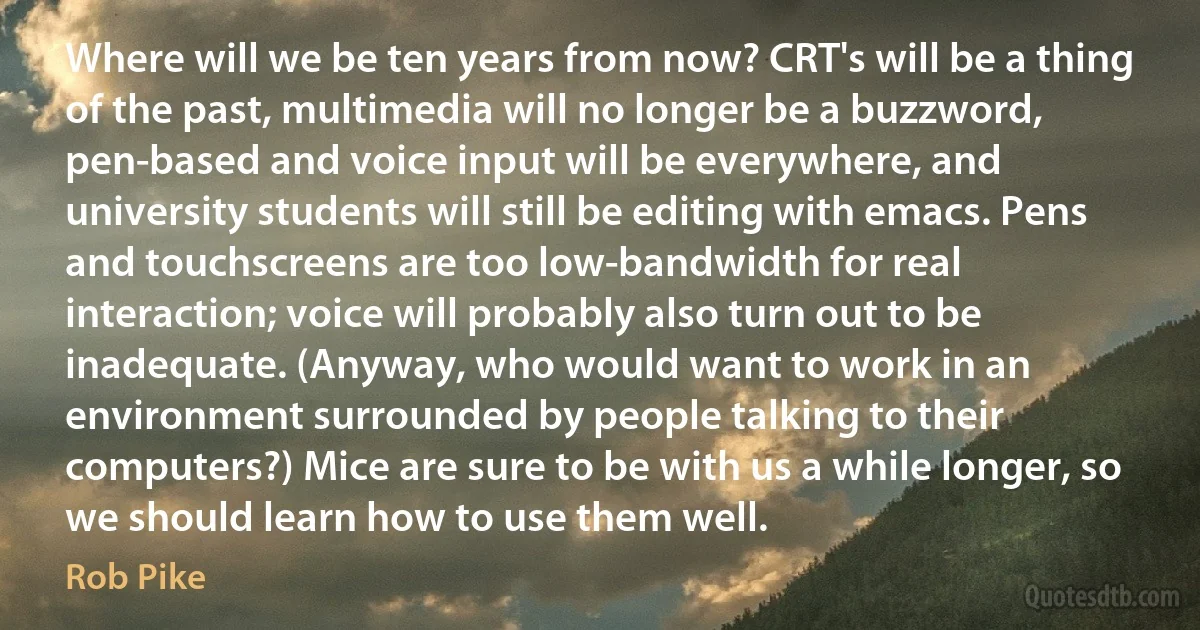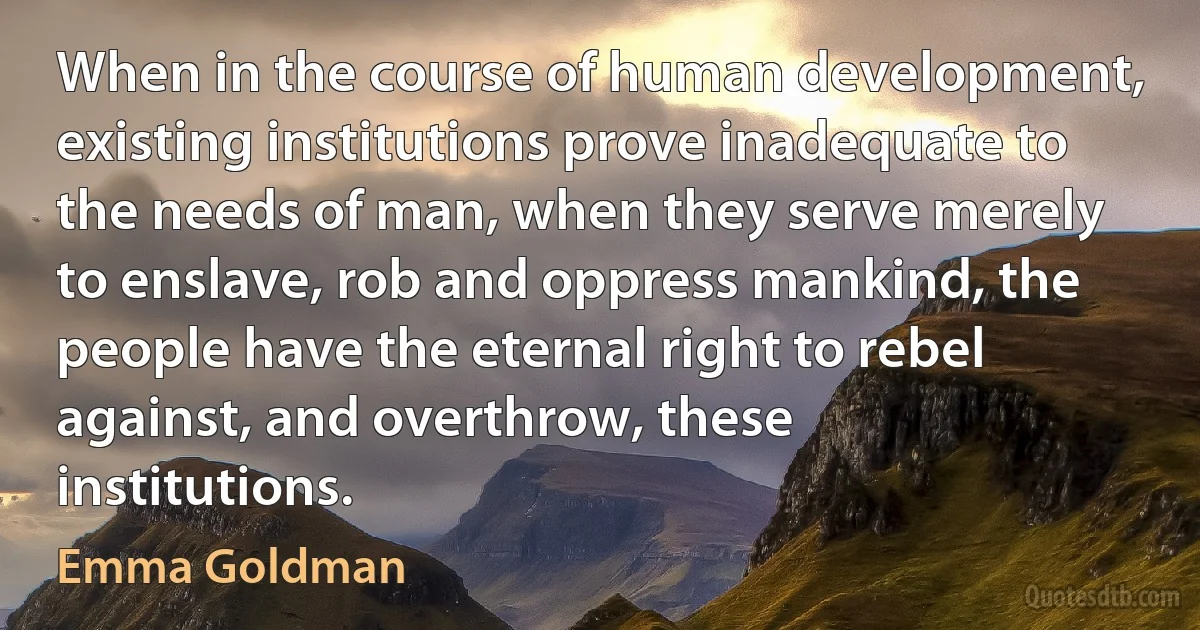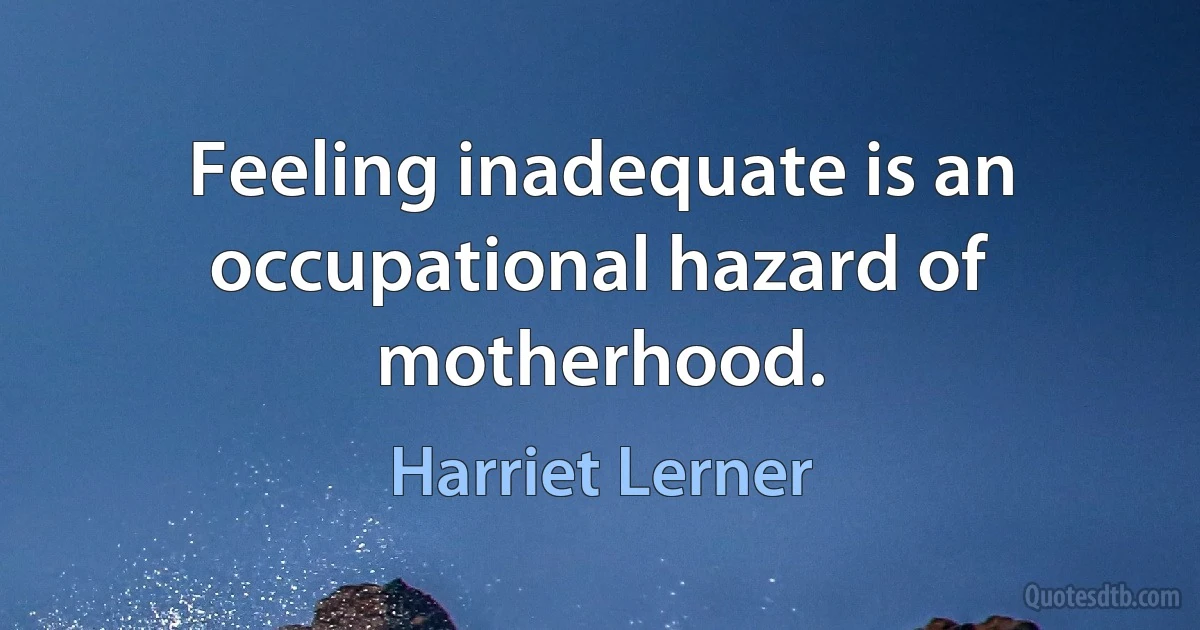Inadequate Quotes - page 5
Government is, or ought to be instituted for the common benefit, protection, and security of the people, nation, or community; of all the various modes and forms of government, that is best which is capable of producing the greatest degree of happiness and safety, and is most effectually secured against the danger of maladministration and [...] when any government shall be found inadequate or contrary to these purposes, a majority of the community hath an indubitable, inalienable, and indefeasible right to reform, alter, or abolish it, in such manner as shall be judged most conducive to the public weal.

George Mason
The forty-eight hours after the march into the Rhineland were the most nerve-racking in my life. If the French had then marched into the Rhineland, we would have had to withdraw with our tails between our legs, for the military resources at our disposal would have been wholly inadequate for even moderate resistance.

Paul Schmidt
The Enlightenment worldview held by Du Bois is ultimately inadequate, and, in many ways, antiquated, for our time. The tragic plight and absurd predicament of Africans here and abroad requires a more profound interpretation of the human condition - one that goes beyond the false dichotomies of expert knowledge vs. mass ignorance, individual autonomy vs. dogmatic authority, and self-mastery vs. intolerant tradition.

Cornel West
When a man is actually with God, and then sees what he has tried to do and in our terms done so marvellously. it amounts to something which is utterly inadequate. That's what I'm saying: that the steeple reaching up so far, far away, that Salisbury Cathedral has a beautiful steeple, but what is it compared with the sky into which it is reaching? It is in this comparison that one is aware of on the one hand the absurdity of our efforts, and on the other the inadequacy of them.

Malcolm Muggeridge
Determination in a single instance is an expression of courage; if it becomes characteristic, a mental habit. But here we are referring not to physical courage but to courage to accept responsibility, courage in the face of a moral danger. This has often been called courage d'esprit, because it is created by the intellect. That, however, does not make it an act of the intellect: it is an act of temperament. Intelligence alone is not courage; we often see that the most intelligent people are irresolute. Since in the rush of events a man is governed by feelings rather than by thought, the intellect needs to arouse the quality of courage, which then supports and sustains it in action.
Looked at in this way, the role of determination is to limit the agonies of doubt and the perils of hesitation when the motives for action are inadequate.

Carl von Clausewitz
We know, since the theory of relativity at least, that empirical sciences are to some degree free in defining dynamical concepts or even in assuming laws, and that only a system as a whole which includes concepts, coordinating definitions, and laws can be said to be either true or false, to be adequate or inadequate to empirical facts. This "freedom," however, is a somewhat doubtful gift. The manifold of possibilities implies uncertainty, and such uncertainty can become rather painful in a science as young as psychology, where nearly all concepts are open and unsettled. As psychology approaches the state of a logically sound science, definitions cease to be an arbitrary matter. They become far-reaching decisions which presuppose the mastering of the conceptual problems but which have to be guided entirely by the objective facts.

Kurt Lewin
The mental operation by which one achieves new concepts and which one denotes generally by the inadequate name of induction is not a simple but rather a very complicated process. Above all, it is not a logical process although such processes can be inserted as intermediary and auxiliary links. The principle effort that leads to the discovery of new knowledge is due to abstraction and imagination.

Ernst Mach
When women and men have approximately equal life expectancies, it seems to be because women die not only in childbirth (fewer than thought) but about equal from... diseases; poor sanitation and water; inadequate healthcare; and diseases of malnutrition. In industrialized societies, early deaths are caused more by diseases triggered by stress, which breaks down the immune system. It is since stress has become the key factor that men have died so much sooner than women.

Warren Farrell
Once man was tossed about helplessly and incessantly by the wind that blew through him-now the toughest of all plants is more sensitive, more easily moved than he. In other words, death is better than life, nothing is better than anything. Nor is this a silly adolescent pessimism peculiar to Housman, as so many critics assure you. It is better to be dead than alive, best of all never to have been born-said a poet approvingly advertised as seeing life steadily and seeing it whole; and if I began an anthology of such quotations there it would take me a long time to finish. The attitude is obviously inadequate and just as obviously important.

Randall Jarrell
Such cultural homosexuality is an alienation more or less forced upon certain groups of Auden's society by the form of their education and the nature of their social and financial conditions. Where the members of a class and a sex are taught, in a prolonged narcissistic isolation, to hero-worship themselves-class and sex; where-to a different class-unemployment is normal, where one's pay is inadequate or impossible for more than one; where children are expensive liabilities instead of assets; where women are business competitors; where most social relationships have become as abstract, individualistic, and mobile as the relations of the labor market, homosexuality is a welcome asset to the state, one of the cheapest and least dangerous forms of revolution.

Randall Jarrell
I had this sense that ideas about democracy, theories of democracy which I had learned about of course from graduate school on, from Aristotle and Plato onward, that they were inadequate. I don't want to diminish them; I have always retained a great respect for classical and medieval and eighteenth-century theory, but meanwhile a whole new kind of political system emerged to which the term democracy became attached, and for which democracy remained an ideal, even though classical democracy as an ideal was so far removed from reality. The gap between that ideal and the actual political institutions that had developed, particularly from about the sixteenth, seventeenth century on, was just enormous. And what we didn't have enough of, had very little of, was an adequate description of what the actual institutions of so-called democracy, modern democracy, representative democracy, were.

Robert A. Dahl
I feel that while we are indeed engaged in a war against terror, it is inadequate and even misleading. If Churchill had informed the country in 1940, we are engaged in a war against bomber aircraft and submarines, that would have been an accurate statement but not a very helpful one. To say we are engaged in a war against terror is of the same order. Terror is a tactic. It's a method of waging war. It is not a cause, it is not an adversary, it is not anything that one can identify as an opponent, and I think we need to be more specific in fighting a war. It's useful to know who the enemy is. I think you would agree.

Bernard Lewis



